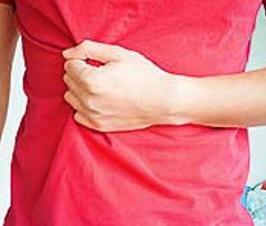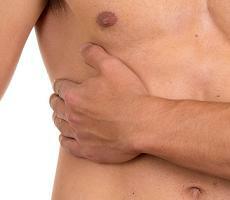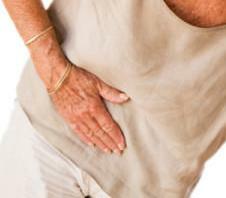 Quite often, when going to see a therapist, people complain of aching, dull pain in the right hypochondrium.
Quite often, when going to see a therapist, people complain of aching, dull pain in the right hypochondrium.
Syndrome of the "right hypochondrium" is an indicator of a large number of different diseases, but it happens that discomfort in the right side of the body worries and quite healthy people.
In this area are such important organs as the kidney, pancreas, gall bladder, liver, diaphragm. Now we will talk about what can cause pain in the back, right hypochondrium and in the right side.
Possible causes of pain
Pain in the right upper quadrant can be the result of certain diseases:
- gallbladder (may be - cholelithiasis, cholecystitis, stasis of bile);
- pancreas (tumors and pancreatitis);
- diaphragm (diaphragmatis, tumor, hernia);
- liver (such as - hepatitis and cirrhosis);
- intestines (appendicitis, ulcer of duodenum);
- right kidney (pyelonephritis, urolithiasis);
- heart diseases (myocardial infarction, angina pectoris);
- diseases of the right lung (pneumonia, pleurisy, lung cancer);
- osteocondritis of the spine;
- tumors of all these organs;
- injuries of these organs;
- shingles.
If you look at the statistics, most people complain of pain in the right upper quadrant due to gallbladder diseases.
Pain in the right upper quadrant in front
If it hurts on the right under the rib in front, the cause may be diseases of such organs as:
- hepatitis, cirrhosis, bile stasis;
- acute or chronic cholecystitis, cholelithiasis;
- pancreatitis, pancreatic cancer;
- ulcer of duodenum and appendicitis;
- diaphragmatic hernia;
- myocardial infarction or angina pectoris;
- shingles;
- pleurisy, pneumonia;
- giardiasis, amoebiasis, opisthorchiasis.
Pain in the right hypochondrium behind
In this area, the injuries of the lower ribs, intercostal nerves, the right kidney, the adrenal gland, and the lower hollow vein most often hurt.
- urolithiasis disease;
- pyelonephritis;
- necrosis of the renal papillae;
- acute upper parnephritis;
- kidney cancer;
- the right adrenal gland;
- contusion of ribs;
- intercostal neuralgia;
- osteochondrosis of the lumbar region;
- shingles;
- thrombosis of the hollow vein.
Most often, the pain in this area is associated with the pathology of the right kidney - pyelonephritis (chronic or acute).
Pain in the right upper quadrant giving in the back
If the pain is given in the back, then the reasons can be as follows:
- Liver is inflamed, with viral hepatitis and other abnormalities in the body;
- With injuries of the intestine, gallbladder and right side of the diaphragm;
- With a hernia of the spine, osteochondrosis, arthrosis of the intervertebral joints;
- With inflammation of the gallbladder and dyskinesia of bile ducts;
- With pancreatitis, ulcers and other pathologies of the pancreas;
- With kidney pathology, abscesses, ulcers and kidney stones.
Aching, dull pain in the right hypochondrium
 Dull aching pain is a common sign of chronic inflammation. This kind of pain in the following pathologies.
Dull aching pain is a common sign of chronic inflammation. This kind of pain in the following pathologies.
- Acute and chronic hepatitis, cirrhosis, liver cancer, parasitic lesions of the right lobe of the liver.
- Pyelonephritis, hydronephrosis, apostematous nephritis, renal tumors in the late stages.
- Chronic ciliary and noncalculous cholecystitis without exacerbation, cholangitis.
- Colitis of mild degree, diverticulosis of intestine.
- Tumors of the adrenal glands.
Constant pain is characteristic of tumors, metastatic lesions of internal organs, parasitic cysts of the liver, fractures of the ribs.
Pain during exercise
Very often pain in the right hypochondrium occurs with physical activity (running, fast walking), which can be tingling or aching. As a rule, the reason arises in the event that this load began sharply and at a high rate.
Accordingly, with this load, blood flow increases, and a large flow of blood is sent to the liver, causing the capsule to stretch, and painfully reflexes.
Acute cholecystitis
The most dangerous form of the disease develops rapidly, accompanied by pronounced symptoms:
- severe paroxysmal pain in the gallbladder;
- deterioration of well-being;
- nausea and repeated vomiting;
- increased body temperature;
- lack of appetite;
- a violation of digestion (constipation, diarrhea, increased gas production in the intestine).
Chronic cholecystitis
The main symptom of chronic cholecystitis is pain in the right upper quadrant - prolonged or paroxysmal, giving to the scapula and the right shoulder. It can spread to a fairly wide area of the chest and back. Sometimes the pain is accompanied by weakness, cardialgia, fever and other signs.
Outside the exacerbation of the patient from time to time experience dull pain in the epigastric region and in the right hypochondrium. During exacerbations, the symptoms of chronic cholecystitis are similar to those of an acute form of the disease.
Gallstone disease
While the stones are in the gallbladder, the patient may not even know about his illness. Suspect this disease a person can only during the first alarming signs: bitterness in the mouth, discomfort in the right upper quadrant, heartburn, belching and nausea.
If the stone from the gallbladder goes into the bile ducts, then at this moment there is an attack of cholelithiasis (biliary colic).
Acute pyelonephritis
 The clinical picture of pyelonephritis is characterized in typical cases by three main symptoms:
The clinical picture of pyelonephritis is characterized in typical cases by three main symptoms:
- increase in temperature to 38-40 ° C and chills;
- disorders of urination;
- pain in the lower back.
Other common symptoms: weakness, malaise, decreased appetite, nausea, vomiting, headache, pain in muscles and joints, profuse sweating.
Pain in the lumbar region in the early days do not have a clear localization, then they are accurately determined at the level of the diseased kidney. Pain can give in the hypochondrium, groin, genitals. Pain increases with movement, coughing, and also at night. Urination becomes rapid and painful.
Chronic pyelonephritis
Despite the non-specificity of the symptoms of the disease, it is possible to identify some signs of chronic pyelonephritis, which should be noted.
- a causeless rise in temperature in the evening to 38 ° C and above,
- fast fatigue, weakness,
- frequent headaches,
- the feeling that the loin is constantly cold,
- the occurrence of pain in the lumbar region, especially when walking,
- frequent urge to go to the toilet,
- changes in the color of urine, its turbidity,
- the appearance of uncharacteristically unpleasant odor in urine.
The clinic of the disease depends on the presence of concomitant urological diseases and on its pathogenesis.
General symptoms of hepatitis C
In general, hepatitis C is an asymptomatic disease, it is diagnosed more often by accident, when people are examined for other diseases. Therefore, timely diagnostics are important analyzes.
More often than other symptoms are asthenia, weakness, fatigue. But these symptoms are very nonspecific (one their presence does not allow talking about hepatitis C). With cirrhosis of the liver, jaundice may appear, the stomach (ascites) increases in volume, vascular asterisks appear, and weakness grows.
Treatment
If the pain on the right under the ribs, the therapist usually appoints a consultation with the following specialists:
- Gastroenterologist;
- Infectionist;
- Cardiologist;
- Gynecologist;
- Surgeon;
- Traumatologist;
- Endocrinologist;
- Neuropathologist.
Not having established an accurate diagnosis in a medical institution, it is forbidden to engage in self-medication. In case of acute pain, it is recommended to call an ambulance, apply cold (if it helps to relieve pain).
In this case, you can not take painkillers, so as not to distort the clinical symptoms and not complicate the formulation of the correct diagnosis.

How to choose probiotics for the intestine: a list of drugs.

Effective and inexpensive cough syrups for children and adults.

Modern non-steroidal anti-inflammatory drugs.

Review of tablets from the increased pressure of the new generation.
 Antiviral drugs are inexpensive and effective.
Antiviral drugs are inexpensive and effective.


